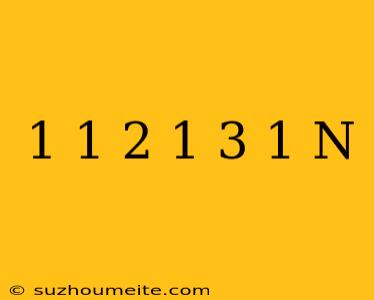Infinite Series: 1-1/2+1/3-...+1/n
Introduction
In mathematics, infinite series are a fundamental concept in calculus. One of the most intriguing infinite series is the alternating series:
1 - 1/2 + 1/3 - 1/4 + ... + 1/n
This series, known as the Alternating Harmonic Series, has been extensively studied and has many interesting properties. In this article, we will delve into the properties and behavior of this series.
Convergence
One of the most important questions about an infinite series is whether it converges or diverges. In the case of the Alternating Harmonic Series, it can be proven that it converges. This means that as the number of terms increases, the sum of the series approaches a fixed value.
Proof of Convergence
To prove the convergence of the Alternating Harmonic Series, we can use the Alternating Series Test. This test states that an alternating series converges if the absolute value of the terms decreases monotonically and approaches zero.
In the case of the Alternating Harmonic Series, the absolute value of the terms decreases monotonically, and the limit of the terms as n approaches infinity is zero. Therefore, the series converges.
Sum of the Series
The sum of the Alternating Harmonic Series is a fascinating topic. It can be proven that the sum of the series is ln(2), where ln is the natural logarithm.
Proof of the Sum
To prove that the sum of the Alternating Harmonic Series is ln(2), we can use the Taylor Series of the natural logarithm.
The Taylor Series of ln(1+x) is:
ln(1+x) = x - x^2/2 + x^3/3 - x^4/4 + ...
By substituting x = 1, we get:
ln(2) = 1 - 1/2 + 1/3 - 1/4 + ...
which is the Alternating Harmonic Series.
Conclusion
In conclusion, the Alternating Harmonic Series 1-1/2+1/3-...+1/n is a fascinating infinite series that converges to ln(2). Its properties and behavior have been extensively studied, and it has many interesting applications in mathematics and other fields.
